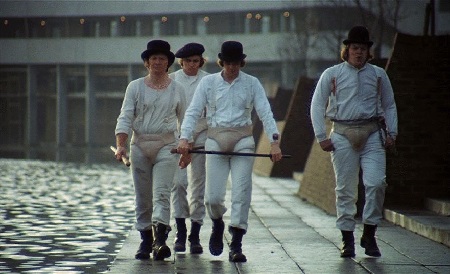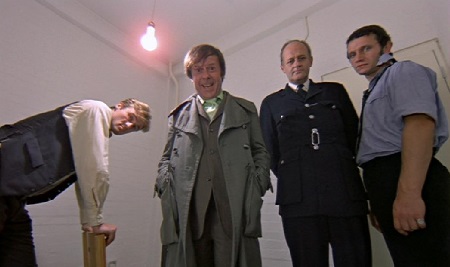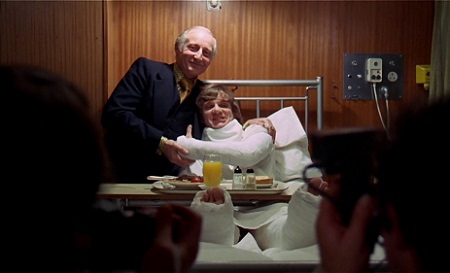To say that we review a dystopian crime film feels like understatement. The Stanley Kubrick film adaptation of the 1962 Anthony Burgess book A Clockwork Orange shrinks not from the book; that the movie, titled A Clockwork Orange (1971), comments on an aversion experiment also understates the movie presented for your consideration.

To ask if this movie as presented was necessary misses much. The film focuses extensively on Alex DeLarge, an antisocial yet charismatic delinquent with wildly inappropriate interests in committing outrageously excessive acts of violence, rape and theft. Malcolm McDowell portrayed DeLarge, curiously enjoys classical music with a fixation on the music of Ludwig van Beethoven.

The film uses disturbing, violent imagery to comment of psychiatry, juvenile delinquency, youth gangs as led by Alex DeLarge with mates Dim, Pete and Georgie at the forefront of it with DeLarge. Writer Frank Alexander and his wife, as portrayed by Patrick Magee and Adrienne Corri, were victims of crime by Alex’s gang. Warren Clarke, Michael Tarn and James Marcus portrayed Dim, Pete and Georgie, respectively. The vulgar and graphically depicted crime spree of this group, with narration before and after by Alex, is followed by Alex’s capture. The heinous and visceral emotions evoked by this make the film difficult to recommend.

The period leading to Alex’s capture and subsequent processing into custody were as jarring and dehumanizing, eliciting conflicting feelings that contest those of crimes Alex committed. The motivation P.R. Deltoid, who was aware of the lewd and depraved behavior of Alex and his gang, makes him just as complicit. The permission to participate in DeLarge’s eventual intake into custody through the police inspector and a pair detectives was just as reprehensible. Aubrey Morris, Lindsay Campbell, John J. Carney and Steven Berkoff portrayed Deltoid, the police inspector, and the detectives, respectively.

With Alex in custody, British Minister of the Interior Frederick, as portrayed by Anthony Sharp, sets about experimental psychological conditioning on Alex. The experiment aims, in lieu of prolonged jail time, to rehabilitate Alex in a manner that redirects the offender in what will be declared a well-adjusted, healthy and safely functioning member of society. The dark psychological uses of Beethoven‘s Symphony No. 9 in D Minor, Op. 125 (Ninth Symphony) and Gene Kelly‘s Singin’ in the Rain, with the systemic responses before and subsequent with these points, reflect trauma like the original crimes, including what follows with Georgie and Dim as police officers.

The circular absurdity of the story with powerful cultural references to make distinct commentary into the distasteful law enforcement and criminal segments of society. Controversy surrounded and surrounds this movie to this day. While A Clockwork Orange by Stanley Kubrick remains a powerful film exemplifying the director’s skills as a storyteller, I give the movie 3.75-stars on a scale of 1-to-5.
Matt – Saturday, July 15, 2023
